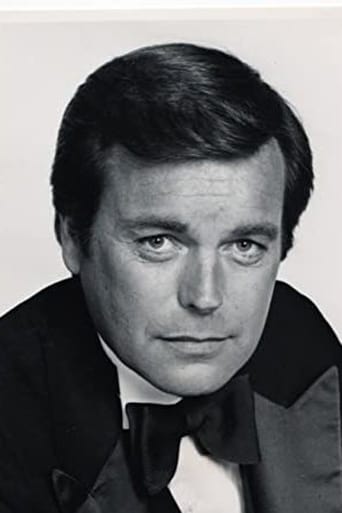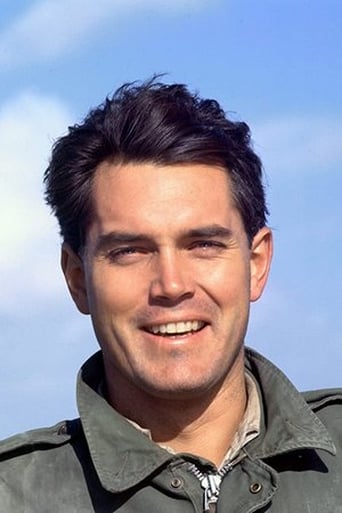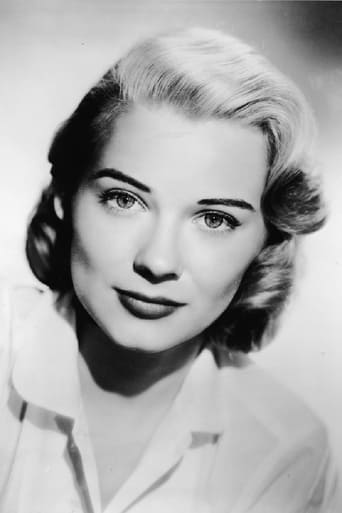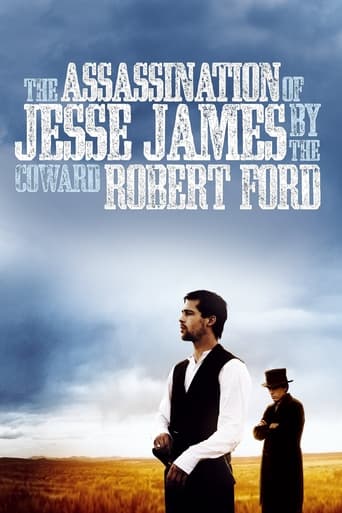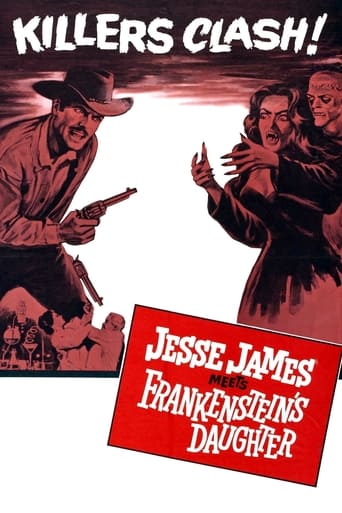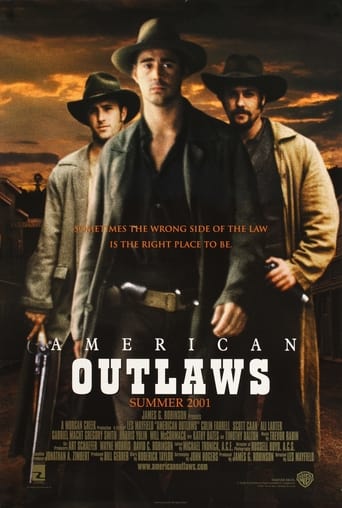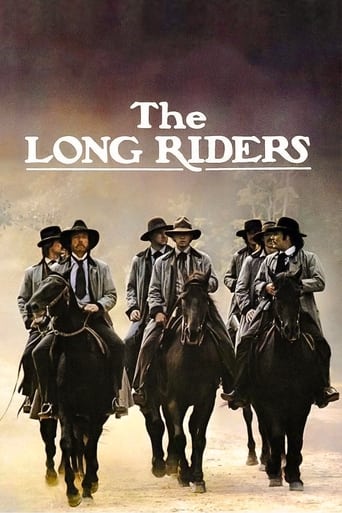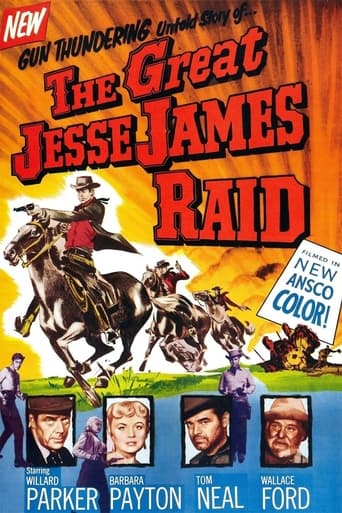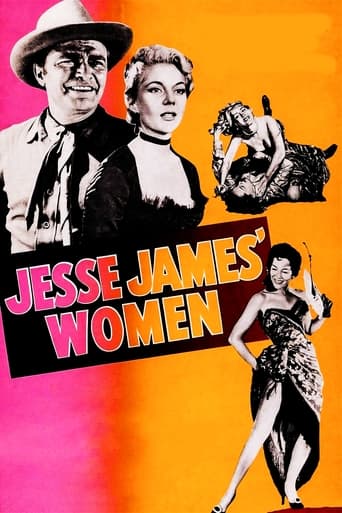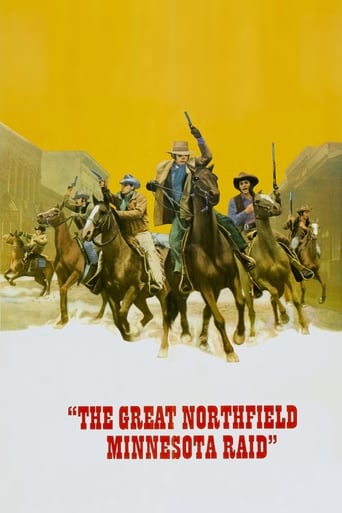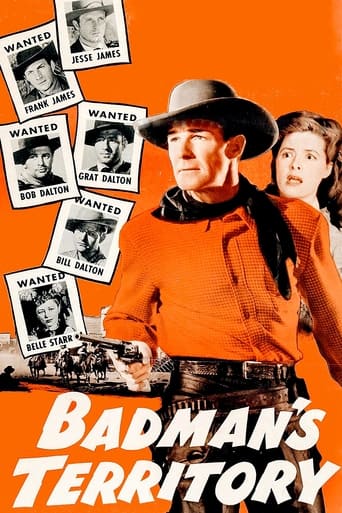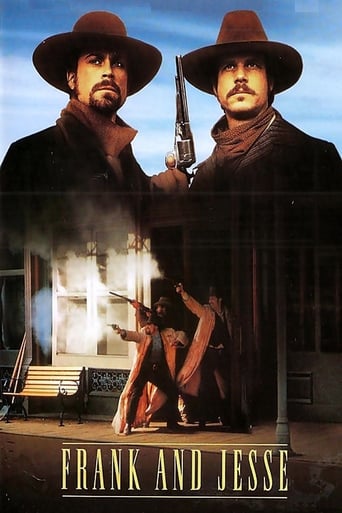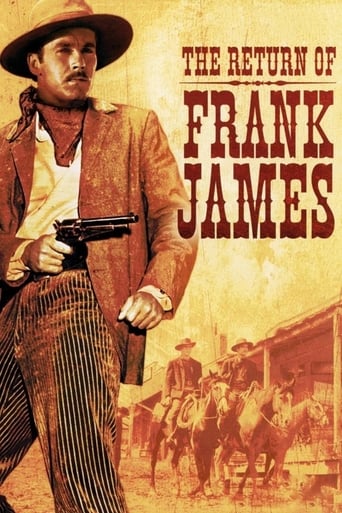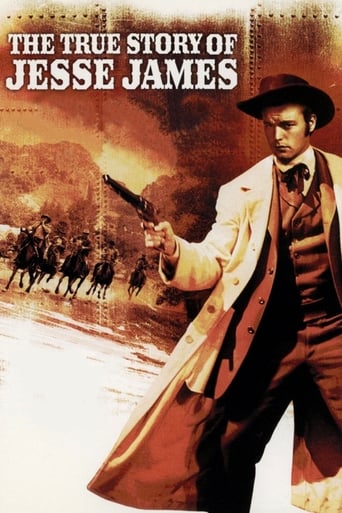
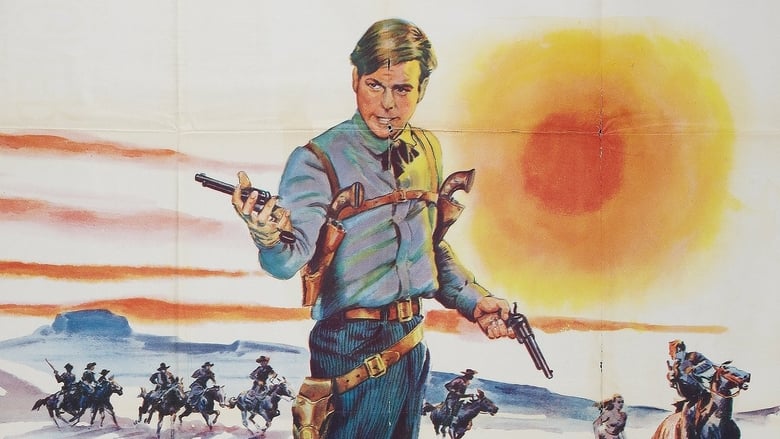
The True Story of Jesse James (1957)
Having fought with the Confederacy during the Civil War, Jesse James and his brother Frank dream of a farm life in Missouri. Harassed by Union sympathizers, they assemble a gang of outlaws, robbing trains and becoming folk heroes in the process. Jesse marries his sweetheart, Zee, and maintains an aura of domesticity, but after a group of lawmen launch an attack on his mother's house, Jesse plans one more great raid -- on a Minnesota bank.
Watch Trailer
Cast


Similar titles
Reviews
True Story of Jesse James, The (1957)** 1/2 (out of 4)Handsomely produced remake of Fox's 1939 film JESSE JAMES tries to tell the reasons why Jesse and his brother Frank were such bad men. The film starts off just after the Civil War as Jesse (Robert Wagner) and Frank (Jeffrey Hunter) have their farms burned due to them fighting for the South. The proud Southerners need money to start over so they decide to form a gang and begin robbing banks. Many people take exception to this film because of the title as well as a prologue that tells us this film is as close to the truth as you can get. Needless to say, there are several liberties taken with the "true" story but I personally never go into a movie expecting a history lesson so I don't mind things being changed around. Overall I thought this was a pretty good version of the James Gang even if it doesn't hold a candle to the 1939 film or its sequel. It's interesting to note that John Carradine, who played Bob Ford in the Fox movie and its sequel, plays a preacher here. Another interesting move was casting Wagner and Hunter as the James brothers. If you read enough reviews you'll see that opinions are split on both of them but I personally thought they were quite good. They're not going to make you forget Tyrone Power or Henry Fonda but I thought both men brought their own personalities to the roles. Wagner seems to be doing a James Dean-ish type performance but it was never overly dramatic. Hunter is probably the best thing in the movie as I really enjoyed his father-like qualities as he tries to keep Jesse on somewhat of a good track. Hope Lange has a few embarrassing moments as Jesse's wife including one really bad line delivery when James is returning home from the war injured. Agnes Moorehead does a good job as the boy's mother and we even get Alan Hale, Jr. playing Cole Younger. Carradine is pretty laughable in his few minutes on the screen, although they're so memorable that you might want to consider them the highlight of the film. One happens when he shows up at the mother's deathbed and is asked to pray for her boys, which he refuses because his "prayers are for the mother". The mother then upsets him so much that he starts ranting about how evil the boys are and it's rather funny especially when he's suppose to be calming the mother. Another funny scene has Carradine baptizing Jesse and his wife and his Biblical speech is pretty amusing. There are quite a few things working against the film that keeps it from being a complete winner and one is the screenplay, which never seems to know what type of story it wants to tell. At one point it wants to make you like the boys but then it wants to remind you that they were cold-blooded killers. At one point it tries to be a Western but then it throws in some psychological stuff that ends up not going anywhere. The screenplay could have used some work but Ray at least makes a visually interesting film.
Scenarist Walter Newman adapted Nunnally Johnson's screenplay from the 1939 Henry King western "Jesse James" with Tyrone Power and Henry Fonda for his script for "Johnny Guitar" director Nicholas Ray's quasi-remake "The True Story of Jesse James" with Robert Wagner and Jeffrey Hunter as Jesse and Frank James. Ray and Newman cover all the main narrative points that the King film handled, but "The True Story of Jesse James" lacks anything in the way charisma, suspense, or surprises. Wagner plays the legendary folk hero here with little of the luster than most movies about the James' Gang muster. Whereas Power and Fonda were sympathetic outlaws, Wagner and Hunter are far from likable. "The True Story of Jesse James" differs in many respects from "Jesse James." This film lacks the sentimentality of the King epic. Mind you, Twentieth Century Fox encores scenes from the original where Jesse and Frank plunge their horses off a cliff into a river to elude a posse as well as their escape from the botched Northfield robbery by riding through a store. The final scene when Jesse is shot in the back by Bob Ford is virtually identical to the Power version. The problem with this revisionist take of the notorious James gang is that is consists of several flashbacks. Ray and Newman open the western with the disastrous bank robbery in Northfield, Minnesota, and the James' gang's desperate bid to escape the authorities. While they are holed up in a cave waiting for nightfall to elude the search parties, Frank and Jesse recount their lives, going back as far as when Jesse was beaten up by Union troops in the Civil War. The Younger Brothers emerge as far more likable than the James' brothers, and Cole Younger (a portly, pipe smoking Alan Hale, Jr., of "Gilligan's Island") is as close as any character comes to serving as comic relief. The scene when the gang is eating lunch at the home of a widow woman who needs $600 to pay off her landlord is as close as this movie comes to having comic relief. Cole gives the old woman the sum of twenty dollars rather than the ten cents that she says he owes her. He adds that he is Cole Younger and wants to be remembered well. Jesse hears the part about the old woman needing the $600 and gives her the money to prove that he--Jesse James--does take from the rich and give to the poor. No sooner has the gang left the premises than the landlord shows up and takes the $600 from the widow. Since the gang hasn't left the premises, Jesse holds up the landlord and recovers the six-hundred dollars that he gave the old woman. The fire-eating publisher that Henry Hull played in the original appears but doesn't hog the comic relief. Once again, the title suggests the reason for this remake. Ray and Newman try to imbue the legend with authenticity. Wagner's Jesse is a cold-blooded, callous individual, and Wagner makes his performance a business only effort. Wearing a mustache, he displays nothing that would endear us to him.Ray and Newman don't follow the straight-forward, chronological narrative pattern of "Jesse James." They fracture the story line with the memories that the James boys have and they show the horrible conditions that prompted the protagonists to pursue the owl hoot trail. This time, however, Jesse is far more violent and willing to kill. The irony is that Jesse spends considerable time and detail orchestrating his elaborate plans, only to see them collapse like a flimsy deck of cards because of ill-fated luck and/or incompetence by his underlings. At one point, it appears almost certain that the James brothers are bound to receive amnesty after the Remington Detective Agency blows up their mother's house, depriving his mother, Mrs. Samuel (Agnes Moorehead of "Raintree County'), of an arm and her youngest son Archie of his life. Instead, Jesse guns down the man who helped the detectives; indeed, he pumps four bullets into the unarmed man. Jesse's treatment of his accomplices is pretty callous and he threatens at least one of them, Tucker (Clegg Hoyt of "The Brass Legend"), with death when he botches an important role in the Northfield robbery. Basically, aside from Joe MacDonald's elegant Cinemascope lensing of the action, "The True Story of Jesse James" qualifies as little more than a potboiler. The outlaws do look cool in this white dusters that they all wear when they ride into Northfield. The last scene reflects the feeling of the times. After Bob Ford shoots Jesse in the back and kills him, the neighbors pour into the premises to gawk at the corpse. Frank runs them out, but as some leave, they appropriate souvenirs from the James' possessions. Clearly, this film reflects some of director Nicholas Ray's concerns about youths in the 1950s as it is essentially about a "Rebel with a Cause." The production values are above-average.
Every re-telling of the Jesse James story has been flawed. This picture has neither the carelessly cobbled script of "The Long Riders" nor the Robert Duvall version's annoying quirkiness and skewed morality. However, it is a highly selective narrative omitting much of the suffering caused by the Jameses and with several outright distortions of the historical record. For example, when he was shot by Robert Ford, Jesse James was in the process of assembling a new gang, not about to retire to the life of a farmer as depicted here.Robert Wagner is appropriately youthful in the title role. As brother Frank, the impossibly handsome Jeffrey Hunter has little to do but acts well. Agnes Moorehead plays Mrs. Samuel, the matriarch, as too saintly for my taste. But portraying a media-savvy Cole Younger, Alan Hale leads a particularly able supporting cast including, as an honorable Union soldier, the father of contemporary star Kurt Russell.The narrative is anchored to the disastrous expedition to Northfield, Minnesota. One nice touch, copied in a later retelling, was the inclusion of a Swedish-speaking actor to play one of the two town residents killed by the gang.
The True Story of Jesse James was the third Western directed by Nicholas Ray after fabulous Johnny Guitar and rather average Run for Cover. At the time director took the project he was at the peak of his prestige mainly due to an enormous success of the film he made prior to The True Story, which is Rebel Without a Cause. He was one of the highest paid directors in Hollywood at the time and the most beloved one by James Dean. Also he was one of the few directors who managed to get a certain independence from the Studio's control, an independence that was proven in making of Bigger Than Life, when his opinion won over the one by film's main star and producer James Mason. But with the True Story of Jesse James, those glorious days where over. It was the first Nick Ray's film where his artistic freedom was completely taken away by the producer and the studio, the first film where he didn't have the final word in making of it, and also the most hated one by the director himself, who later referenced to it in `F**g awful' terms, as being the film completely different from the one he was intending to do when took the project. One of the main points he mentioned later was the construction of the story in ill-achieved and ridiculous flashbacks, instead of which Ray wanted to move the story back and front several times without any explanation to the viewer, avoiding using the cliché flashback sequences with the narration by Jesse's mother and Zee, which were used in final version of the film, regardless of his opinion re-edited by the order of then Fox producer Buddy Adler, who found it difficult to understand the development of the story while seeing it in the director's cut. Also with The True Story that Ray obtained the reputation of the rebel, of a difficult person to work with and realized that his artistic freedom was quite limited. In the film we follow the true-life story of legendary James brothers, Jesse and Frank, played by Robert Wagner and Jeffrey Hunter, which starts with the ill-fated bank robbery that goes wrong and while the brothers are on the run from the authorities, the story moves back and tells as the 18 years of their lives prior to that, the circumstances which lead them to become the most famous outlaws in the history of the West, their successes and final separation which resulted in tragic end for Jesse and helped in moulding of Jesse James' figure as a legend of the West, the beginning of which is shown in the film's marvellous ending with the blind man singing the Jesse James song predicting so the future immortality destined to the hero. The True Story of Jesse James continues with the chain of rebel personalities so characteristic of the Nicholas Ray films with Robert Wagner as Jesse James following James Dean in Rebel Without a Cause and John Derek in Run For Cover where the role of the characters' past in forming of their without a cause future is quite obvious. Ultimately it's one of those numerous films in Hollywood history, which probably could have been great, provided the director was given the opportunity to make it the way he wanted. 7/10


